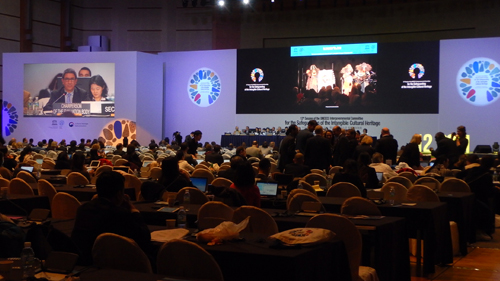09 December 2017
Bahrain Participates in the 12th session of the Intergovernmental Committee for the Safeguarding of the Intangible Cultural Heritage

As part of its strategy to enhance international efforts to preserve and safeguard world heritage, Bahrain Authority for Culture & Antiquities, represented by H.E Shaikha Khalifa Bin Ahmad Al-Khalifa, Director of Museums Department at BACA, has taken part in the12th session of the Intergovernmental Committee for the Safeguarding of the Intangible Cultural Heritage. The meeting took place from 4 December to 9 December 2017 in Jeju island, Seoul (Republic of Korea) and was chaired by Ambassador Lee Byong-hyun, Permanent Delegate of the Republic of Korea to UNESCO.
During its session, which will end on 9 December, the Committee will examine the periodic reports submitted by 11 States Parties to the Convention regarding legal, regulatory or other measures taken to safeguard intangible cultural heritage in their countries. Other topics to be discussed include intangible cultural heritage in situations of emergency, the impact of the Convention and the allocation of resources from the Intangible Cultural Heritage Fund.
Over the six days, the twenty-four members of the Committee, elected by the General Assembly of the 2003 Convention, discussed a number of issues that are important for the safeguarding of living heritage around the world. Part of the meeting was dedicated to the international cooperation mechanisms established under the 2003 Convention, such as inscriptions on the Lists and requests for International Assistance as well as the examination of national reports and the accreditation of NGOs. On this occasion, the Committee also being asked to examine some important items such as the establishment of an overall results framework for the Convention, the use the Intangible Cultural Heritage Fund together with proposals for two funding priorities for the next four years as well as the complex role that communities play in safeguarding their living heritage at risk in emergencies.
The Committee also consider six nominations for inclusion on the List of Intangible Cultural Heritage in Need of Urgent Safeguarding designed to rally international cooperation and assistance for threatened cultural expressions. 33 nominations for inscription on the Representative List of the Intangible Cultural Heritage of Humanity were examined alongside two proposals for the Register of Good Safeguarding Practices and two International Assistance Requests for safeguarding plans or inventories. A number of other issues were tabled to initiate reflections that could lead to some important redirections in the overall implementation of the Convention. These included proposed reforms to the periodic reporting systems, the roles of accredited NGOs and other actors, and nature of the listing mechanism.
Worth to mention that the Intergovernmental Committee for the Safeguarding of the Intangible Cultural Heritage numbers 24 representatives of States Parties to the 2003 Convention, elected for a four-year term. It meets once a year.







